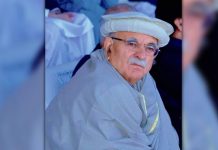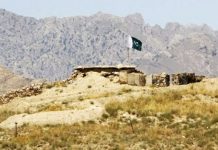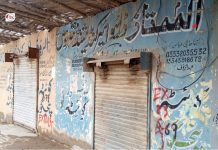Author: Safar Khan Baloch
In the chilling morning of December at Fida Shaheed Chowk, an elderly man cloaked in a Balochi shawl, murmured with weeping eyes as he cleaned the dust on a picture. “I have cleared the photo, but I wonder where should I place it that I can find solace. I feel as if the image is questioning me.” These heart-wrenching words are of week and aged Nako Mayar, one of the participants in the recent protest at the Shaheed Fida Chowk in Turbat. Nako Mayar is taking part in a long march from Turbat to Quetta and then on to Islamabad to seek the recovery of his forcibly disappeared son, carrying his image throughout the journey.
Having experienced the highs and lows of life, Nako Mayar, who once lived a normal life herding in the mountains, is now emotionally affected and weakened by the separation from his young son. Despite being a resilient mountain man, he finds himself shedding tears at the sight of every person where he sees a little ray of hope, pleading for the safe recovery of his son.
Nako Mayar, a free-spirited mountain dweller, never imagined that one day he would be seen on the highway from Turbat to Quetta and carrying the photo of his young forcibly disappeared son. He spent his entire life herding amidst the hills and singing songs, songs brimming with the heat of life. With hundreds of sheep in his possession, he lived a content life, singing Zaheerunks, entrusting his life to the world of melodies.
His life takes a turn when he is forcibly displaced from his native place. Later, the enforced disappearance of his son threw him into the harsh realities of life, forcing him to face the horrors of urban areas, void of compassion and love. While the enforced disappearance of his son with these words, “My son looks like an officer, he is innocent, still a little kid, still not entitled to a national identity card, he is holding only B-form (issued by the National Data Base Registration Authority of Pakistan for minors). I am a dweller of mountains, I am strong enough to endure hardship but my son, he is our Prince, I never allowed him to bring water for himself.”
Nako Mayar is part of the current wave of political resistance against Pakistani atrocities in war-torn Balochistan. He is a part of a long March, starting from Turbat Makran, passing through Jhalawan, and reaching Quetta, trying to shake the rulers with his faint voice. He continues to march with hundreds of other aggrieved families of forcibly disappeared persons toward Islamabad toward confronting the rulers in Islamabad with his defiant voice against their injustices.
In his entire life, let keep aside Quetta and Islamabad, he even did not visit Turbat city, which is just 40 kilometers away from his native place. There is a bleak chance that he might have heard about these cities from the electrical waves of the radio. In the 21st century, which is the era of technology, but Nako Mayar is living in the 18th century where modern wonders of technology are like fairy tales for him. His young son, Fateh Baloch, was the entire reason for his existence, who was the anchor of his old age. But his son also fell prey to those vicious policies of Pakistan to counter the resistance for the freedom of Balochistan. His son was forcibly disappeared, and a dweller of the mountain was forced to introduce to the new jungle of concrete and cemented buildings.
Nako Mayar’s son, Fatah, is a bright student who studies in the morning and teaches other children in the evening. Nako has pledged that when his son will be recovered, vowing not to let him study throughout his life, and planning to return to the mountains to spend his life with him.
Balochistan, where life stories are woven with the threads of struggle, and Nako Mayar’s story is not unique and the only one; every household in the Baloch land is filled with tales of wounds inflicted by Pakistan.
In this long march, a youngster can be seen who is holding the picture of his father Jan Mohammad. His father was whisked away by Pakistani spy agencies when he was just a 6 years old kid. He is following the footsteps of Sammi Baloch whose father Dr. Deen Mohammad Baloch was abducted when she was a little child. Since then Sammi Baloch is struggling not only for her father’s safe recovery but also she is now the voice of the families of all missing persons.
Saira’s story is not different from the war-torn tales of other children in Balochistan. Dreaming of becoming a lawyer while wearing a black coat, she is compelled by her brothers’ forced disappearances to stand against the chilly winds of Islamabad. Rather debating international laws in the lush corridors of the university with her fellow classmates, now her life is struggling with facing the commissions and judges and sitting in the camps of forcibly disappeared persons. An elderly mother, hardly standing with the help of a wooden stick, came from a village, Kaanak and joined the long march hoping for a breakthrough in the recovery of her son, Sayad Islam Shah.
The agony of her son’s enforced disappearance is evident on the face of another elderly woman who keeps secured a passport-size photo of her disappeared son in a matchbox, responding with a heavy heart when a journalist asked if it was his last picture of her son. She replied with pains and agonies and said, “No, he is my last offspring” (her other sons were forcibly disappeared by Pakistani spy agency, kept in torture cells, and their bullet-riddled bodies were thrown away in desolated places.)
Nako Mayar is only a single character in this tragic epic unfolding story of Balochistan. Nako came to Fida Shaheed Chowk to share his grief and pain with others. However, numerous Nako Myars are experiencing such pain, whose stories are yet to find words.
While writing these stories, sometimes the words will desert you, and the storyteller himself becomes a victim of the narratives. The storyteller is also a part of these stories scattered in the vast canvases named Balochistan.
Disclaimer: The views and opinions expressed in this article are those of the author and do not necessarily reflect the official policy or position of The Balochistan Post or any of its editors.





























